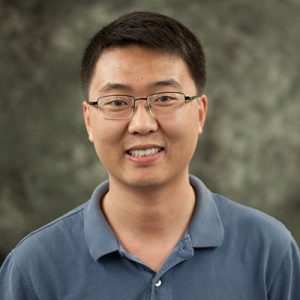
Yanguang “Carter” Cao, Ph.D., has received an R35 Outstanding Investigator Grant worth $1.85 million over five years from the National Institute of General Medical Sciences to create a platform to optimize antibody-based therapy.
“Therapeutic antibodies have achieved great success in a variety of autoimmune diseases and cancers; however, their full therapeutic potential has not yet been realized,” said Cao, an assistant professor in the Division of Pharmacotherapy and Experimental Therapeutics at the UNC Eshelman School of Pharmacy.
Many FDA-approved antibodies now face high therapeutic hurdles, such as inadequate efficacy when used alone and high occurrences of resistance, and many of these therapeutic hurdles have arisen from antibody-discordant interactions with host systems, Cao said. He said he plans to use the NIGMS award to develop a platform that consolidates the fundamental properties of antibody and host systems and further explores and assures their spatial and temporal coordination to alleviate or even sidestep therapeutic hurdles and facilitate efforts to optimize current antibody-based therapies.
“Some hurdles can be overcome by engineering new antibody entities with either improved target selectivity or functionality,” Cao said. “Many others remain unresolved as they are not just about the antibody itself but a result of antibody failing to play along with the host system.
For instance, CD20-targeted antibodies — used in drugs such as rituximab used to treat certain autoimmune diseases and cancers — often face acquired resistance that is due to overwhelming antibody exposure to the immune system leading to exhausted effector functions and then loss of drug sensitivity.
“To resolve those issues, we are developing a system platform that collectively consolidates the fundamental dynamics of the antibody and the host system, particularly the host immune systems, and integrates their spatial/temporal coordination,” Cao said. “This platform can alleviate or even sidestep these therapeutic hurdles and facilitate efforts to optimize the current antibody-based therapies. We are developing this system platform on multiple scales from cells to the whole body by collectively evaluating all steps of antibody actions from dosing to their final responses.”
Cao said his team has been collaborating with experts in the fields of radiology and molecular imaging to develop novel labeling approaches to track antibody entities and immune factors at multiple levels — such in the blood, in tissue interstitial fluid and around specific immune cells — and assess antibody system persistence and distribution to the sites of action, dynamics of immune functions in response to antibody therapy and eventually figure out how to get them to play along in order to unleash the great potential of antibody in treatment of cancers and autoimmune diseases.

